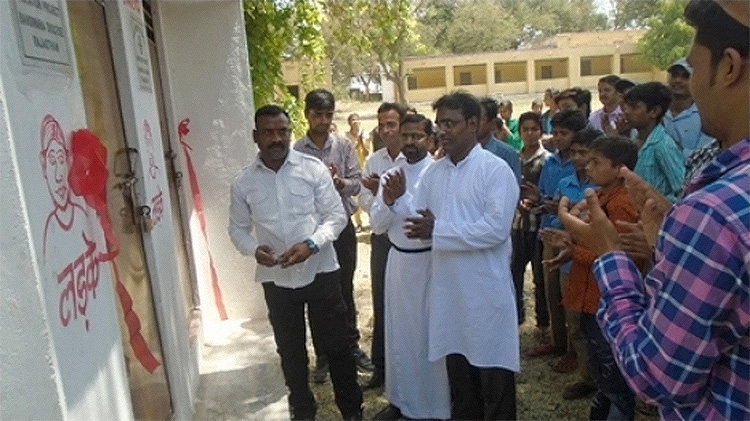Global focus brings attention to Gospel for Asia’s efforts to improve health and well-being by helping provide simple essentials, sanitation facilitiesWILLS POINT, Texas — Ribbon-cutting ceremonies typically mark the opening of a grand new building, but in Asia they can even celebrate a more modest, but life-changing construction—of a simple outhouse.

The enthusiastically attended formal dedications follow the provision of desperately needed sanitation facilities, often available for use by multiple families, by GFA-supported (Gospel for Asia) workers helping improve the health and quality of life of those in low-income, rural communities.
As they are year-round, teams will be engaged in the construction of these outdoor toilets on World Toilet Day (Nov. 19), whose “When Nature Calls” theme spotlights the huge cost of inadequate sanitation. Providing everyone with basic sanitation by 2030 is one of the United Nations’ sustainable development goals.
Currently, millions risk sickness and death from disease because they do not have access to a toilet, while women and girls are in danger of assault when forced to find a remote spot in the open to use as a bathroom. Some girls stay home from school because a lack of facilities exposes them to danger.
Toilet construction has been part of GFA’s caring work for years, providing such basic essentials as a demonstration of God’s love and care for those on the margins of society. Last year, teams provided almost 6,500 toilets to communities across Asia.
Along with installing toilets, Gospel for Asia (GFA)-supported workers also drill community wells and distribute water filters, and teach good hygiene practices. That includes promoting the “Swachh Bharat” open-defecation-free campaign—discouraging people from relieving themselves in the open—launched by the Indian government.
As part of its efforts, Gospel for Asia (GFA) is also attempting to raise more awareness of the scale of the health threat resulting from poor sanitation. The subject has been highlighted in a major article addressing key global issues that includes the following sobering statistics:
- 2.3 billion people live without basic sanitation facilities
- almost 900 million people with no alternative have to defecate in the open
- 280,000 deaths annually are linked to diseases like cholera, dysentery, typhoid, and polio, resulting from inadequate sanitation
“Basic sanitation is not just about health, as vitally important as that is,” said Gospel for Asia (GFA) founder Dr. K.P. Yohannan. “It is also a matter of both safety and dignity. I praise God that he allows us to meet such basic needs in his name. God cares about all our life, and it is good for us to care about others in the same way.”
As evidence of GFA’s major emphasis on providing good sanitation, a new toilet is featured in its 2018 Christmas Gift Catalog (https://www.gfa.org/gift). Although it seems an unlikely gift, just $160 provides an outdoor toilet for families in need.
Previous recipients have told of how the provision of a simple toilet has greatly improved their lives. “They provide comfort and convenience with a sense of security and dignity to each member of the house,” said one man.
“We were forced to go out in an open area to relieve ourselves in spite of toilets available in the school, but they are broken and in a bad condition,” said a girl student in one community. “These new toilets will really be a blessing for us.”
To schedule an interview with a GFA representative, please contact Gregg Wooding @ 972-567-7660 or gwooding@
To read more news on the still pressing need of Basic Sanitation Facilities, go here.
GFA (Gospel for Asia, www.gfa.org) and its worldwide affiliates have—for almost 40 years—provided humanitarian assistance and spiritual hope to millions across Asia, especially among those who have yet to hear the Good News. Last year, this included more than 70,000 children, free medical services in over 1,200 villages and remote communities, 4,000 wells drilled, 11,000 water filters installed, Christmas gifts for more than 200,000 needy families, and spiritual teaching available in 110 languages in 14 nations through radio ministry.
